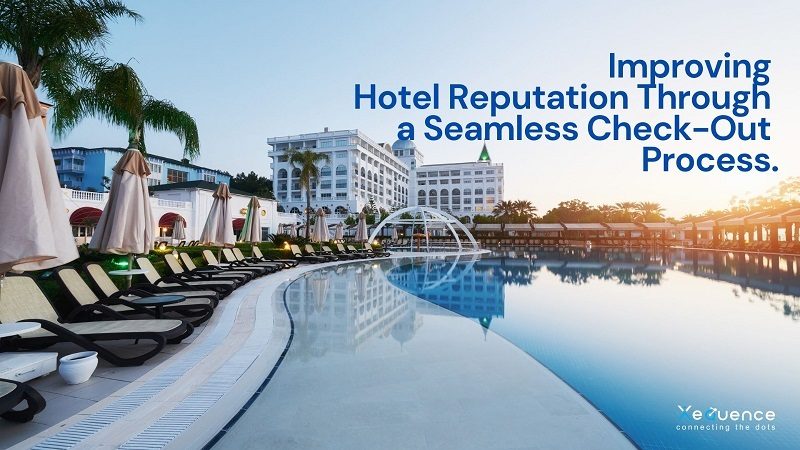Improving Hotel Reputation Through a Seamless Check-Out Process
- June 27, 2024
- Rajib Kar
- Chatbot, Hotel Marketing, Technology

A smooth and customized check-out can improve a visitor’s opinion
The check-out is a crucial part of building a hotel’s image as it provides a last chance to make a good impression on visitors. A smooth, quick, and customized check-out procedure can greatly improve a visitor’s opinion of their entire stay. Through the use of technology, hotels may minimize wait times and offer convenience through features like mobile checkouts and automated billing. Furthermore, leaving a lasting impression on visitors can be achieved with considerate gestures like delivering loyalty rewards, gathering feedback, and creating personalized farewells. Positive feedbacks are stimulated by a seamless check-out process, which also increases guest satisfaction. A smooth hotel checkout, which serves as the final point of contact, may make a guest’s departure into an unforgettable experience that highlights the hotel’s dedication to providing outstanding service and solidifies its stellar image in the hospitality industry.
What is reputation management in a hotel?
When it comes to the hospitality industry, reputation management speaks about the techniques used to check shape, and enhance their public and guest perceptions. Monitoring comments, evaluations, and feedback from a wide range of sources—including social media, online review sites, and direct consumer feedback channels—is an important part of the reputation management process. To create a positive public image, it also entails actively interacting with customers by answering their evaluations, attending to their issues, and emphasizing their positive experiences.
Why is reputation management important?
Reputation management is crucial for several reasons. Nowadays, the majority of travelers make their hotel selections primarily on internet evaluations and ratings. A significant 82 percent of participants indicated that reviews play a crucial role when selecting a place to stay. However, 79% of respondents said they would choose a hotel with a better rating if given the option. Consequently, having a good reputation can have a big impact on what guests decide to book, which can boost sales.
Reputation management strategies
Stay active on social media
Connecting with your followers directly through social media is the ideal way to visually represent and personalize your company. The secret to sustain your community is to keep active presence on social media. A consistent tone should be maintained across all platforms, so be sure to strike it.
Relationship building with prospective planners and attendees can also be facilitated by social media platforms. Make use of your profiles to reassure visitors that your hotel is secure and that you follow all health and safety precautions. Posting updates on local events and how your hotel has changed would be helpful because your guests will view you as the authority on your establishment.
Engage with your audience in real-time
To increase repeat business and bookings, social media is essential for establishing rapport and cultivating brand loyalty with organizers and visitors. Answer all inquiries and give prompt attention to any feedback, whether it’s favorable or unfavorable. With your team, do Twitter Q&As session for event planners, sharing your responses with your followers. To get a competitive edge, strive to be available for guest support around-the-clock on apps such as Facebook Messenger or WhatsApp. Improve customer service by using live chat on your website; companies report notable increases in sales and loyalty. Make sure every contact is genuine and unique to enhance the reputation of your hotel. Give quality precedence above speed in response times in hotel check-in.
Optimize your website for search
An essential component of maintaining your hotel’s reputation is search engine optimizing your website. Your website is more likely to be found if it has a high search engine ranking. Search engines are where 93% of online encounters start, so you should make sure your website stands unique.
Furthermore, your website’s search rank can drop if Google believes that visitors are not having a positive experience. A mobile-friendly website, secure pages, and quick page loading should be your main priorities. If you want to assess your webpage quality and make improvements, Google Lighthouse tool is very helpful.
Respond to reviews promptly and professionally
Seventy-two percent of customers expect a review response within days, at most a week, according to a customer satisfaction survey, and eighty percent of consumers expect it within two weeks. As a large organization, you most likely won’t be able to reply to every review that comes in every day. It is advisable to respond to as many evaluations as you can if you are the owner of a smaller property and your reputation hasn’t yet grown.
And that includes reviews of any kind. Thanking visitors for their visit and taking the time to write a favorable review is a good way to acknowledge positive feedback.
Put emphasis on digital marketing
It is imperative to stay up to date in order to avoid falling behind as the digital world is ever-changing. Make sure to emphasize in your communications during this recession how hard you are working to support both your clients and staff. The measures you are taking to maintain hygienic circumstances, and, if relevant, any future plans you may have.
- Content marketing involves creating relevant contents to build credibility among planners.
- Email marketing is the digital marketing strategy that involves promotional emails to get leads.
- Optimize your social media profiles along with the website.
- Create brand awareness for your hotel and highlight time-sensitive messages.
More than ever, communication and visibility are essential. Planners are interested in knowing your current situation, so provide them a current, illustrated narrative to bolster their confidence. Incorporate widely used search terms into your lucid and pertinent content, and enhance user engagement by incorporating images, videos, and social media.
Avoid negative reviews
A Business Insider article explores how Library Hotel Collection properties positive rankings on the leading platforms like TripAdvisor. As per that magazine, avoiding negative reviews could help you in creating positive vibes. The experts suggest building strong guest relationships to preempt negative feedback, stressing exceptional service at every touch point. Notably, she prioritizes leaving guests with a positive final impression, crucial for maintaining high ratings.
Offer transport services
Most likely, your customers will need to take a flight or another mode of transportation to return home at the end of their visit. Make a taxi reservation available, or simply just give them the schedules for the closest train or airport. A useful and comfortable answer for travelers is the airport shuttle service that some hotels even provide. As a bonus, it will create a positive image and provide a seamless exit for your guests.
Recent Posts
Newsletter
Get regular updates on data science, artificial intelligence, machine
You may also like

AI Travel Assistants: The New Personal Travel Planners

5 Things an AI Travel Assistant Can Do in Seconds

How AI Hotel Chatbots Reduce Operational Costs?




